Eugène François Vidocq, French Criminal turned Detective
The genius of Eugène François Vidocq lay in one simple principle. In order to catch a criminal, you had to be able think like a criminal. And in his case that was easy, because he was one. He’s sometimes referred to as “the French Jonathan Wild”, but that’s hardly fair. Vidocq was smart enough to realise that his profit lay in staying on the right side of the law. And in doing so, he revolutionised how we think of policing.
Eugène François Vidocq, known for most of his life simply as “Vidocq”, was born in the French city of Arras in July of 1775. His father Nicolas-Francois-Joseph was a confirmed member of the bourgeoisie, owning both a bakery and a general store. The 1770s and 1780s were a time of serious economic troubles in France, but Vidocq senior managed to turn a tidy profit dealing in corn. This was enough to give Vidocq the chance of a good education, not that he would take much advantage of it.

Vidocq was a ne’er-do-well teenager, constantly getting into fights and always looking for money to spend carousing with the soldiers from the local garrison. When his father restricted their allowance, both he and his elder brother Francois began stealing from the till at the bakery. Francois was caught and sent to apprentice in Lille, while the till was locked. Vidocq responded by stealing the family plate and selling it at a pawnshop. This resulted in his first stay in prison, when his father had him held for two weeks in the hope that it would scare him straight. It didn’t. Instead he burgled his parents shop, stole two thousand francs from the till, and ran away.
Vidocq’s initial plan was to take a ship to America, but that failed when he decided to go drinking with a sailor he met. He woke up the next morning with his money stolen. He thought about signing on to a ship but then discovered there was a circus in town, which he joined. It didn’t go well; he was scared of the animals, failed to master acrobatics, and refused to eat live chickens on stage. The final straw was when he was engaged to assist in a puppet show with the chief puppeteer and his wife, and the puppeteer caught Vidocq kissing the wife during the show. He left the circus in a hurry, and made his way back to Arras.
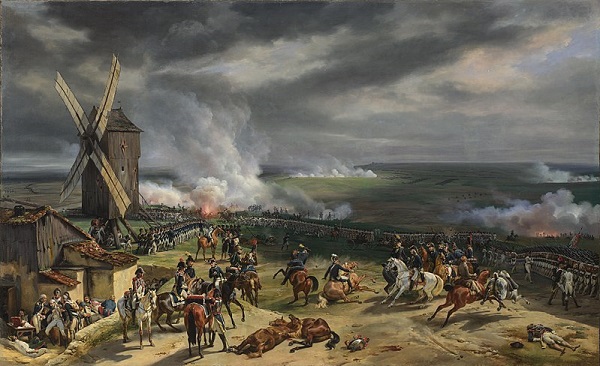
After he had managed to reconcile with his family, young Vidocq decided to enlist in the army. The year was 1791 and the newly born Republic of France was facing down the crowned heads of Europe. Vidocq fit in well in the French army, where he fought fifteen duels in his first six months and earned the nickname of “Reckless”. Some of those duels landed him in the infirmary, but he won most and killed two of his opponents. He fought well enough against the Austrians to be promoted to Corporal, but when he tried to challenge a Sergeant Major to a duel he was instead arrested for insubordination. Rather than stay to face a court-martial (and possible execution), he deserted.
Vidocq didn’t stay deserted long; he and a friend who had deserted with him simply signed up in a different regiment under false names. After he was identified he deserted again, this time crossing the lines and signing up with the Austrians in a French Royalist brigade. When the French announced an amnesty for deserters he left the Austrians and returned to France. After more adventures in the army (including more duels) he was wounded in the leg and in 1793 he was sent home to Arras once more.
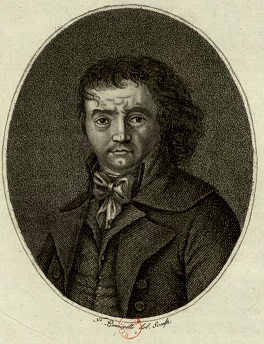
It was a different city that Vidocq came back to. There was a guillotine in the town square, and with the Terror in full swing it was kept well-fed with “enemies of the Republic”. Vidocq himself wound up in trouble when he argued with the musician of the local regiment, who had him arrested and denounced him as a Royalist. He was released by the good graces of a local lawyer, and he started a relationship with the lawyer’s sister, Marie-Anne-Louise Chevalier. When she had a pregnancy scare they were married in haste, but they had time to repent at leisure when they found out she wasn’t pregnant. After Vidocq had squandered her dowry and found her in bed with another man they were separated. Though she would later claim that her son (born six years later) was his, in fact they were never reunited and would eventually divorce in 1805.
Vidocq settled in Brussels, which at that time was under French control. He wound up working as a bodyguard for a gang of card-sharks, while his mother sent him money. Unfortunately he was arrested and asked for his identification papers, and as a deserter he had none. He lied about his name (claiming he was called “Roussea”), but foolishly gave his birthplace as Lille. That meant that he was sent back there, and he knew that when he arrived he’d be executed as a deserter. So he escaped and made his way back to Brussels, where his new criminal friends helped him get some forged papers.
Using those papers he wound up joining the so-called armée roulante (”rolling army”), a two thousand-man strong group of conmen who traveled the country under forged orders pretending to be a regular army division and supplying themselves as such. Unfortunately they were victims of their own success, and they had to disband when the real army were sent to deal with them. Vidocq fled to Paris, where he was cheated of all his money. He retreated to his old base of Lille, where he began a relationship with a woman named Francine Longuet. When she cheated on him he beat up her paramour, which led to him being arrested. This was the beginning of his time spent studying in what he later called “the university of crime”: prison.
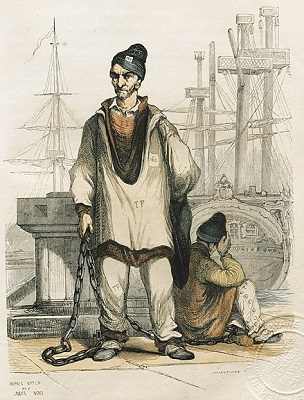
Vidocq’s first lesson was a harsh one in trust. Two other prisoners asked if they could use his cell for some work that needed peace and quiet. He let them, but then found out he had made himself an accessory to forging a release order. When the forgery was detected, he found himself facing trial on a serious charge. He tried to escape several times, but was recaptured and re-imprisoned each time. In this he was helped by Francine, until he made the mistake of cheating on her when he met an ex-girlfriend. She stabbed herself and framed him for attempted murder, though she later retracted the charge. The next time he escaped he fled the city and made his way to the coast. Once again he thought of traveling to America, and once again he couldn’t afford it. So he signed up with a gang of smugglers instead.
Smuggling turned out to be a bit too hot for Vidocq’s taste, so he decided to reunite with Francine and head to Holland. When he went to meet her in Lille he was recognized and arrested again. His next escape resulted in Francine being arrested for helping him. He managed several more escapes on his own, but still kept getting recaptured. Eventually he went to trial for forgery and was convicted. He was sentenced to eight years of service as a rowing slave on a galley. He decided not to appeal, because he thought that his best chance at a proper escape was while he was being transported to the galley.
In February of 1798 after almost three years in prison he finally succeeded in escaping. Though he was picked up for not having papers a few days later, he was not recognised and easily managed to escape (dressed, somewhat improbably, as a nun). He eventually did manage to get to Holland, where he was unfortunate enough to get press-ganged on to a Dutch military ship. He was eventually traded back to the French, but this was getting out of the frying pan and into the fire. He was sent back to prison with three years added to his sentence. Clearly this was intolerable so in March of 1800 he escaped again.
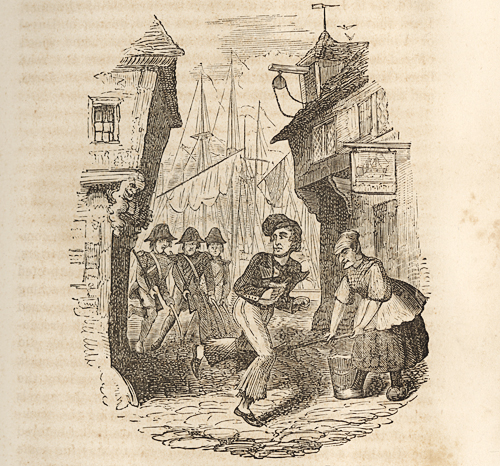
While on the run a gang of burglars asked Vidocq to join them, and when he refused they informed on him to the police and he was arrested. Vidocq decided turnabout was fair play, so he wrote to Napoleon’s chief of police in Lyon (where he was) and offered to inform on them. Since two of the gang were wanted for multiple murders, the chief wanted them. But he didn’t know if he could trust Vidocq. In order to prove his loyalty, Vidocq escaped and then immediately surrendered himself. That convinced the chief, so he was sent out to spy on the gang. Once he knew their next job was going to be the one that the police moved on he contrived to get himself re-arrested so that he could avoid being suspected of betraying them.
Based on this and some other services Vidocq was given a safe conduct to go to Paris, which he immediately broke and headed to Arras instead. He spent two years there before he had to escape to Versailles. In Versailles he was eventually betrayed and arrested, at which point he received two unwelcome surprises. The first was a petition of divorce from Marie-Anne-Louise, while the second was the news that his escapes and escapades had finally resulted in him getting a death sentence. He filed an appeal, but decided not to wait for the results. Instead he escaped again by diving through a window and out to the river below.
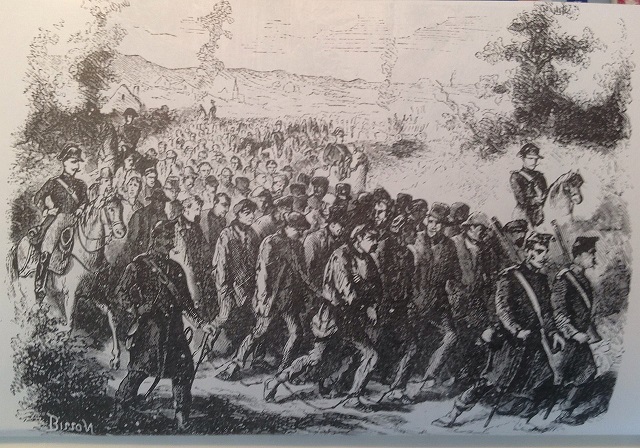
The escaped Vidocq headed to Paris, where he had a moment of revelation when he saw an old friend being guillotined. As a result he did his best to avoid criminality, but he was constantly walking a tightrope and forced to pay off any of his old acquaintances he ran into. He tried to turn informant again, but had little to offer. Eventually he was arrested, and at this point the police agreed to take him on as an informer. He was a prison celebrity for his multiple escapes, but he also had a death sentence hanging over him. So he had no choice but to cooperate, and doublecross men who would have killed him instantly if they found out.
Vidocq being accepted as an informant was dependent on a report being submitted to the Minister of Police, Joseph Fouche that he was not a murderer. Once that had been processed, he proceeded to rat out dozens of his fellow convicts who were in under false names for their true crimes. After 21 months of this perilous trade, he was released. Though of course his release was disguised as an escape, and of course he still had to keep working for the police if he wanted to remain free. So in 1811 the criminal Vidocq officially (though secretly) became a member of the police force.
It was secret partially to protect Vidocq from blowback and partially because of the new nature of his work. The French police used spies extensively, but Vidocq’s great innovation was to organise and professionalise them. He persuaded the powers that be to let him found La Brigade de Sûreté (”The Security Brigade”), a plain-clothes branch of the police who were allowed to operate across the entire city. Since most police forces were confined to specific jurisdiction, it was this and not their origin as spies that came to define La Sûreté. Eventually they would transform into La Sûreté Nationalle, with authority over the whole of France.
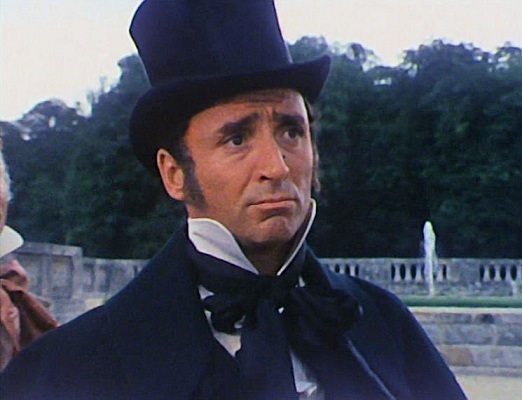
Vidocq himself took part in the spying for a while, but as his successes increased and his stature within the police force grew he gradually began to take a backseat. He eventually burned his cover in spectacular fashion with a raid on a cabaret in the suburb of Courtille where he made everyone march out in single file and marked all those he knew to be wanted with a chalk cross. Thirty-eight men were arrested, and Vidocq was exposed as a police spy. When he went to the prison and was berated for this, he reminded his accusers that they were equally happy to betray each other every chance they got. Over time he rebuilt his reputation with them, and eventually he became known as a policeman who was willing to give a criminal a chance.
In fact the Sûreté was staffed almost exclusively with criminals, something which horrified the “old guard” policemen and made Vidocq many enemies. This did serve the function of isolating him from “the establishment”, which meant that he was unaffected by the turmoil caused in 1814 when Napoleon was deposed, returned from exile, and was deposed again. In fact the intrigues of first Royalists and then anti-Royalists produced plenty of work for Vidocq and his Sûreté. This service was recognised in 1817 when he finally received a pardon from the King for his past crimes.
In 1820 Vidocq married for the second time. His bride’s name was Jeanne-Victoire Guerin, and various rumours paint her as either a rich widow he married for her money (though he was quite rich himself by now) or a high-class courtesan (which was probably just slander). She settled into a household with Vidocq, his mother (who had stood by him through thick and thin), and his twenty-seven year old cousin Fleuride-Albertine Maniez.
Vidocq had many more successes over the next few years, some within Paris and some outside. The countryside of France was home to roving gangs of criminals known as Chaffeurs, which means “Heaters”. They were called this because they would break into houses and then hold the resident’s feet in the fireplace until the location of any valuables was revealed. One notorious gang was led by a 72 year old woman called Prudence Pezé, better known as “the Wolf of Rainecourt”. In order to take them down Vidocq had to infiltrate them, join them on three raids, and suggest the perfect target: an old rich man who lived alone. It was a genuine target, but when they attacked it they found it had been transformed into a trap. The gang were killed or captured, and the Wolf of Rainecourt went to Paris to meet Charles-Henri Sanson.
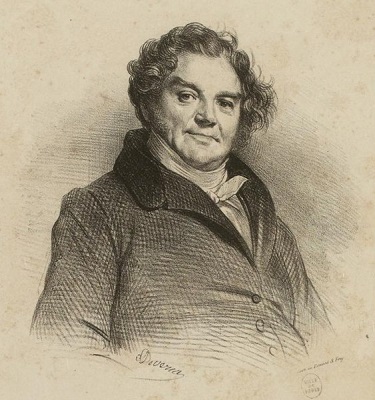
1824 was a year of tragedy for Vidocq. His wife died in June, and his mother died in July. Both of these deaths deeply affected him, and his family in Paris was reduced to his cousin Fleuride-Albertine. (She married him six years later in 1830, and was probably his mistress for a long time before that.) 1824 was also a bad year for Vidocq professionally: King Louis XVIII died and was replaced by Charles X. Charles was an ultra-conservative who was not well disposed to former criminals acting as police officers. His rule gave free rein to Vidocq’s enemies to attack him in a thousand needling ways, and eventually in 1827 he handed in his resignation. This left him free to release his memoirs in 1828, which (despite being largely fictionalised) were a huge success. They were a window into a criminal world for the respectable, and did well enough to be translated into English and begin to build the legend of Vidocq.
Vidocq was a rich man when he retired, and he decided to try to do some good (and turn a profit in the process). He set up a paper factory in Saint-Mandé, one of the villages outside Paris that has since been consumed by the city. His plan was to help criminals to reform by employing ex-convicts, who normally found it impossible to find honest work. Of course, this scheme horrified the pious hypocrites of the area who found the idea great in principle, but not if it was going to be in their back yard. The real killer to his scheme were the purchasers of the goods, who refused to pay the market price and demanded a huge discount. In 1831 the expenses drove Vidocq into bankruptcy, and the factory closed.
In Vidocq’s absence from the city the crime rate in Paris had skyrocketed, while the police were more concerned with stifling dissent against King Charles. They failed, and the July Revolution of 1830 had forced him from power. (The monarchy had not fallen again, though. The king had been replaced with his more liberal distant cousin, Louis-Phillipe.) Vidocq’s enemies within the police had also been forced to resign during the turmoil. The stage was set for his return, and after he provided some assistance to the police in a few matters the chief of police was convinced to restore him as head of the Sûreté.
Vidocq’s new appointment didn’t last long. There were a variety of factors at work, but the main one was that as a police official he was a protector of the monarchy. This made him a target for the Republican press, and his past made him a relatively easy one. His successes were minimised, his failures magnified, and his generally dubious tactics were exposed. Vidocq was a believer in “proactive policing”, which often took the form of outright entrapment. His undercover officers committed crimes to maintain their cover, and Vidocq tried to protect them. This then undermined prosecution witnesses in general, which Vidocq was blamed for. In November of 1832 he handed in his resignation again, with the excuse that his wife was ill.
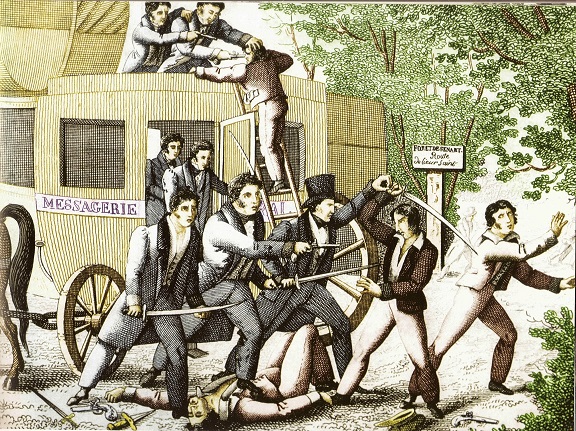
Vidocq was out of the police force, but he was well aware that he still had a reputation as a man who got things done. So he founded something new: a private detective agency. The Bureau des Renseignements mainly concerned itself with debt collection and helping victims of swindlers recover their money, with a percentage commission. They employed an office staff and around forty field agents with nicknames like “the Satyr”, “the Cyclops”, “the Man About Town”. The clients (and the commissions) came roaring in, and Vidocq once again became a wealthy man. He even released another book, Les Voleurs (”The Thieves”). It was a non-fiction book about the underworld that was in large part an advertisement for the agency, but the subject matter was compelling enough that it was a huge success.
Vidocq’s primary problem was the police, who had it in for his agency from the start. He was taken to court several times and charged with going beyond the bounds of the law, as were his agents. The first serious blow came in 1837 when the police raided his office over a national security matter. He had taken up money-lending as a sideline, and four War Ministry clerks who had been stealing secrets were debtors of his. Vidocq was arrested and charged with corruption of public officials and “the pretension of public functions”. Three hundred and fifty witnesses were called, and eventually the case was dropped.
The next serious blow came in 1842. Vidocq was careless in investigating a case of fraud. After locating the fraudster (who was named Champaix), he and his agents escorted the man to their office and forced him to sign a declaration of his crime and accepting his debts. Five days later the police raided the offices and arrested Vidocq on charges of false arrest and similar crimes. Vidocq was sent to the Conciergerie, one of the worst of French prisons. Though the damp seriously aggravated his rheumatism, the police refused to move him. They also tried to block his wife from visiting, only giving in after she had made three appeals.
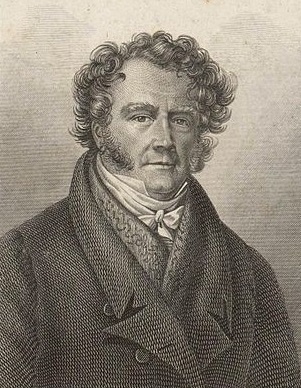
Vidocq was in prison for months before the trial began in May of 1843. Though it was supposed to be about the fraudster Champaix it soon became an excuse for digging through the general conduct of his agency. Great attention was paid to the issue of the agency “kidnapping young women and placing them in convents”, whether at the behest of outraged parents or cuckolded husbands. Whether there was any truth to it or not, the press loved it. And to the French public, the idea that Vidocq was “an enemy of love” soured many on him. The prosecution argued that Vidocq was “a threat to family life”. The defence argued in vain that the ony real charge was Champaix, and that it had not been proven. Vidocq was found guilty, and sentenced to five years in prison.
Of course, he appealed. The conviction was quashed almost immediately; the appeal court took only minutes to decide that the trial had been mishandled. The damage was done, though. Vidocq did his best to try to win back the public, but over the next few years the number of clients coming to the agency began to decline. The one thing which had allowed them to see off the competition was Vidocq’s reputation, but now that was not enough. Vidocq considered selling his agency, but couldn’t find any buyers who were not obvious fraudsters. So in 1847 the world’s first private detective agency closed its doors. The same year Fleuride-Albertine died of cancer. Vidocq, by now seventy-three years old, never remarried.
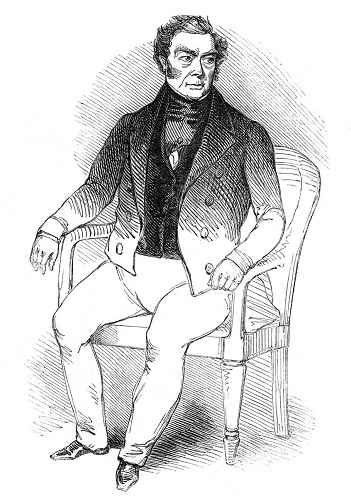
In 1848 there was another revolution, which led to the establishment of the second French Republic. Vidocq was employed by the provisional government to deal with the unrest. It was a time of great turmoil, and among the plots Vidocq foiled was a plan to bomb the government. Unfortunately the government were ousted in the elections that December. Vidocq himself stood for election, but did very poorly. The winner of the elections was Charles-Louis Napoleon, the man who would many years later declare himself emperor and end the second republic. Despite the fact that Vidocq had been spying on him months earlier he offered Napoleon his services, but they were declined.
Vidocq went to prison one last time in 1849, this time for impersonating a priest. He had been hired by a duke to try to retrieve some compromising letters from an ex-mistress, but the exchange had gone south and Vidocq had been arrested. He was released without charge, and that was the end of Vidocq’s last involvement with the law. He spent the next eight years in retirement, though he still took on a few private cases. Near the end of his life the son of his first wife tried to make his way into his life, perhaps hoping to inherit something from the estate. Vidocq showed that he was in prison when the man was conceived, and that was the end of that. In fact despite three wives and dozens of mistresses, Vidocq never had any children. Finally in April of 1857 at the age of 81 Vidocq died.
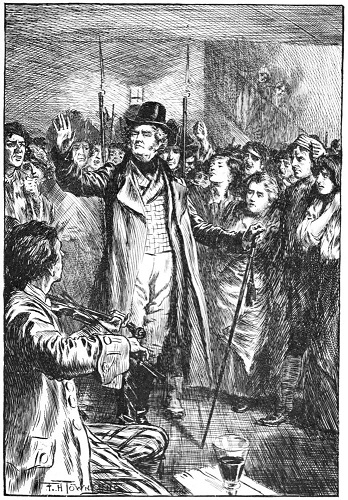
The legend of Vidocq began during his lifetime, fueled not only by his own drive for self-publicity but also by his friendship with writers like the novelist Honoré de Balzac who used his stories and personality as the basis for several characters in his books. This was a tradition that would continue, with both of the main characters in “Les Miserables” (the escaped convict Valjean and the policeman Javier) being based on Vidocq at different periods in his lifetime. His friendships in the literary and theatre world meant that plays and stories about Vidocq’s exploits became common. In fact he was the model for the detectives who inspired the Golden Age of detective fiction, Monsieur Lecocq and Auguste Dupin.
Vidocq’s greatest legacy though was his innovation in policework. Though his innovations in criminology are often exaggerated, his creation of a professional force of plainclothes police detectives was soon copied all over the world. Of course his dubious reputation also counted against him and he was sometimes left out of the official rolls of the heads of “La Sûreté”. The uncomfortable truth that it took someone who could think like a criminal to catch the criminals is perhaps the most lasting legacy of Vidocq.
Images via wikimedia except where stated.
